In this article, we explore the fascinating world of insect hotels and their crucial role in promoting beneficial bugs. These tiny structures, designed specifically to provide shelter and habitat for insects, have gained popularity in recent years amongst garden enthusiasts and environmentalists alike. By creating a welcoming space for these helpful critters, insect hotels not only enhance the biodiversity of our gardens but also contribute to natural pest control. Join us as we uncover the secrets behind these miniature sanctuaries and learn how they can make a positive impact on our ecosystem.
Benefits of Insect Hotels
Attracting Pollinators
Insect hotels are a great way to attract pollinators to your garden. Bees, butterflies, and other pollinating insects are essential for the reproduction of many plants. By providing them with a safe and comfortable place to nest, you can increase the population of these important creatures in your area. This will result in improved pollination, leading to healthier plants and increased fruit and flower production.
Natural Pest Control
In addition to attracting pollinators, insect hotels can also serve as natural pest control mechanisms. Many beneficial insects, such as ladybugs and ground beetles, are voracious predators of pests like aphids and caterpillars. By providing them with shelter, you are giving them a home where they can thrive and help keep the pest population in check. This natural approach to pest control reduces the need for harmful chemical pesticides, making it a safer and more environmentally friendly choice.
Biodiversity Conservation
Insect hotels play a crucial role in biodiversity conservation. By creating a habitat for a variety of beneficial bugs, you are encouraging a diverse ecosystem in your garden. This diversity is not only important for the health of your plants but also for the overall balance of nature. Each insect species has its own unique role to play in the ecosystem, and by providing them with a habitat, you are contributing to the preservation of biodiversity and the overall health of our planet.
Designing an Insect Hotel
The Importance of Materials
When designing an insect hotel, it is crucial to choose the right materials. The materials used should be natural and provide good insulation. Materials such as bamboo, hollow stems, and untreated wood are excellent choices as they mimic the natural habitats of the beneficial bugs you are trying to attract. Avoid using pressure-treated wood or materials treated with chemicals, as these can be harmful to insects.
Providing Adequate Shelter
Insect hotels should have a variety of different-sized compartments to cater to a range of insects. Some insects prefer small, snug spaces, while others need larger space to nest. By providing a variety of shelter options, you can attract a diverse range of beneficial bugs. Different insects may also need different types of nesting materials, such as leaf litter, twigs, or mud. It is important to provide these materials to ensure the comfort and suitability of the insect hotel.
Creating Nooks and Crannies
To further enhance the attractiveness of your insect hotel, creating nooks and crannies is essential. This can be done by using materials like pine cones, plant stems, or pieces of bark. These small spaces provide hiding places and additional nesting options for insects. The more diverse and inviting the nooks and crannies, the more likely you are to attract a variety of beneficial bugs to your insect hotel.
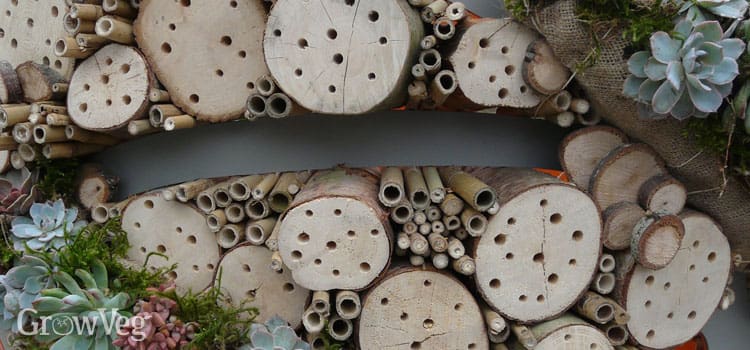
Choosing the Right Location
Considering Sunlight and Shade
The location of your insect hotel is crucial for its success. Insects, like all creatures, have specific preferences when it comes to sunlight and shade. Most beneficial bugs prefer sunny spots for their nests, as it provides warmth and energy. However, it is also important to have areas of shade nearby, as some insects prefer cooler conditions. By choosing a location that offers a balance of sun and shade, you increase the chances of attracting a diverse range of beneficial bugs.
Avoiding Pesticide Exposure
When selecting the location for your insect hotel, it is important to consider pesticide exposure. Pesticides can be harmful to beneficial bugs and may deter them from nesting in your hotel. Avoid placing the insect hotel in close proximity to areas where pesticides are regularly used, such as lawns or gardens treated with chemical insecticides. Opt for organic pest control methods instead to ensure the safety and well-being of your beneficial bugs.
Selecting Suitable Plants
Native Plants and Wildflowers
Choosing the right plants is key to attracting and supporting beneficial bugs in your garden. Native plants and wildflowers are the best option, as they have co-evolved with local insect populations and provide the necessary food sources and habitats. These plants are adapted to the local climate and soil conditions, making them more resilient and attractive to beneficial bugs. Research the native plant species in your area and incorporate them into your garden to maximize the effectiveness of your insect hotel.
Variety in Flowering Seasons
To ensure a steady and abundant food supply for your beneficial bugs, it is important to select plants with a variety of flowering seasons. By having plants that bloom at different times throughout the year, you can provide a continuous source of nectar and pollen. This will not only attract a greater number of beneficial bugs but also enhance their overall well-being by providing them with a diverse and nutritious diet.
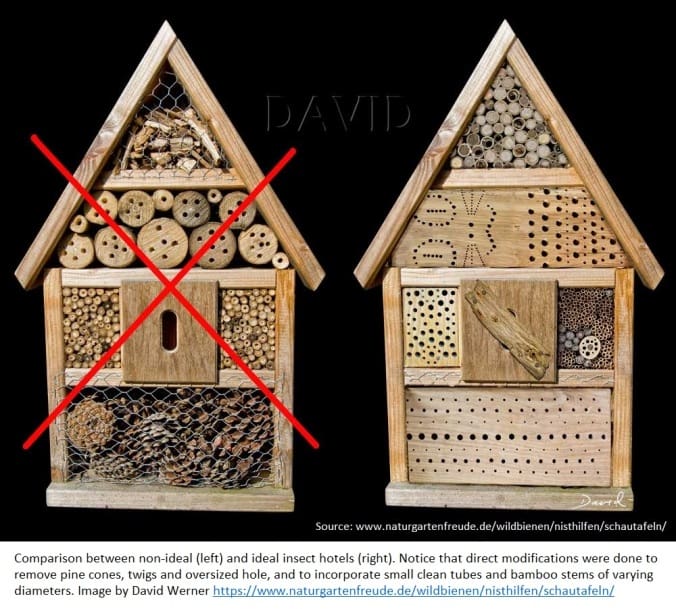
Maintenance and Care
Regular Cleaning and Inspections
To keep your insect hotel in good condition and to ensure its effectiveness, regular cleaning and inspections are necessary. Check for any signs of damage or decay and remove any debris or dead insects. Clean out the nesting compartments at the end of each season to prevent the buildup of pests or diseases. By maintaining a clean and well-maintained insect hotel, you create a hospitable environment for beneficial bugs to thrive.
Renewal of Materials
Over time, the materials in your insect hotel may degrade or become less appealing to insects. It is important to periodically renew the materials to ensure the attractiveness and functionality of the hotel. Replace any damaged or deteriorated materials, such as bamboo tubes, with fresh ones. This will help maintain the integrity of the insect hotel and ensure its long-term effectiveness in attracting and supporting beneficial bugs.
Monitoring for Pest Infestations
While insect hotels are mainly designed to attract beneficial bugs, it is possible for unwanted pests to take advantage of the shelter and resources. Regular monitoring and identification of pest infestations are crucial to prevent the spread of pests and diseases. If you notice any signs of pest infestations, such as mites or parasites, take appropriate measures to address the issue. This may involve cleaning, removing affected materials, or implementing natural pest control methods to maintain a healthy environment for the beneficial bugs.
Identifying Beneficial Bugs
Ladybugs for Aphid Control
Ladybugs, also known as ladybirds, are known for their voracious appetite for aphids. These colorful beetles are highly effective natural predators of aphids and can significantly reduce the population of these destructive pests. By attracting ladybugs to your garden with an insect hotel, you can benefit from their pest control services and enjoy a healthier garden with fewer aphid-related issues.
Mason Bees for Pollination
Mason bees are excellent pollinators and can greatly enhance the productivity of your garden. These solitary bees are gentle and non-aggressive, making them safe to have around children and pets. By providing mason bees with a suitable nesting habitat through an insect hotel, you can increase their population and ensure the efficient pollination of your plants. This will result in better fruit set and improved overall yield.
Ground Beetles for Pest Control
Ground beetles are nocturnal predators that feed on a wide range of garden pests, including slugs, snails, caterpillars, and many other insects. By attracting ground beetles to your garden with an insect hotel, you can create a natural pest control system that helps keep the pest population in check. These voracious beetles are excellent hunters and will actively patrol your garden during the night, preying on pests and protecting your plants.
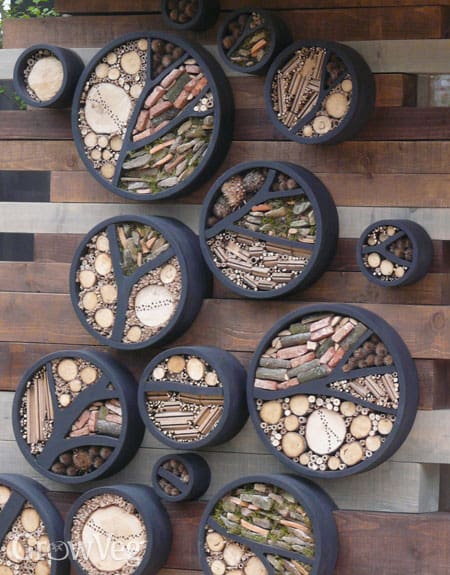
Increasing Awareness
Educating the Community
One of the most effective ways to promote the use of insect hotels and the importance of beneficial bugs is through community education and awareness. Organize workshops or educational events to teach people about the benefits of insect hotels and how to create and maintain them. Provide information on the different types of beneficial bugs and their roles in the ecosystem. By increasing awareness and understanding, you can encourage more people to embrace these eco-friendly pest control solutions.
Promoting School Projects
Engaging schools in insect hotel projects is a fantastic way to promote the concept of beneficial bugs and their importance in the ecosystem. Collaborate with teachers to incorporate insect hotel construction and maintenance into their curriculum. This hands-on approach allows students to learn about the benefits of insect hotels and the role of beneficial bugs while actively participating in creating habitats for these creatures. It also cultivates a sense of environmental stewardship among the younger generation.
Engaging with Local Organizations
Collaborating with local organizations, such as gardening clubs or environmental groups, can help spread the message about the importance of insect hotels and beneficial bugs. Arrange talks or workshops with these organizations to share knowledge and resources. By working together, you can reach a larger audience and have a greater impact on promoting the use of insect hotels for natural pest control and biodiversity conservation.
Choosing the Right Insect Hotel
Size and Design Considerations
When choosing an insect hotel, it is important to consider the size and design. The size of the hotel should be determined by the number of insects you want to attract and the available space in your garden. A larger hotel will accommodate more insects and provide a wider variety of nesting options. The design should be well thought out, with a mix of different compartments and materials to cater to various beneficial bugs. Look for hotels with removable panels or compartments for easy cleaning and maintenance.
Quality of Materials
The quality of materials used in the construction of the insect hotel is essential for its durability and effectiveness. Look for hotels made from natural, untreated materials such as wood, bamboo, or clay. Avoid hotels made from synthetic materials, as they may not provide the necessary insulation and may degrade over time. Quality materials ensure that the hotel provides a safe and comfortable habitat for the beneficial bugs you want to attract.
Accessories and Enhancements
Some insect hotels come with accessories or enhancements that can further attract beneficial bugs. These can include attractions like pheromone lures or nesting materials specifically designed for certain insects. Consider the needs of the beneficial bugs you want to attract and choose an insect hotel that offers the appropriate accessories and enhancements. These additional features can greatly increase the effectiveness and functionality of the hotel in promoting beneficial bugs in your garden.
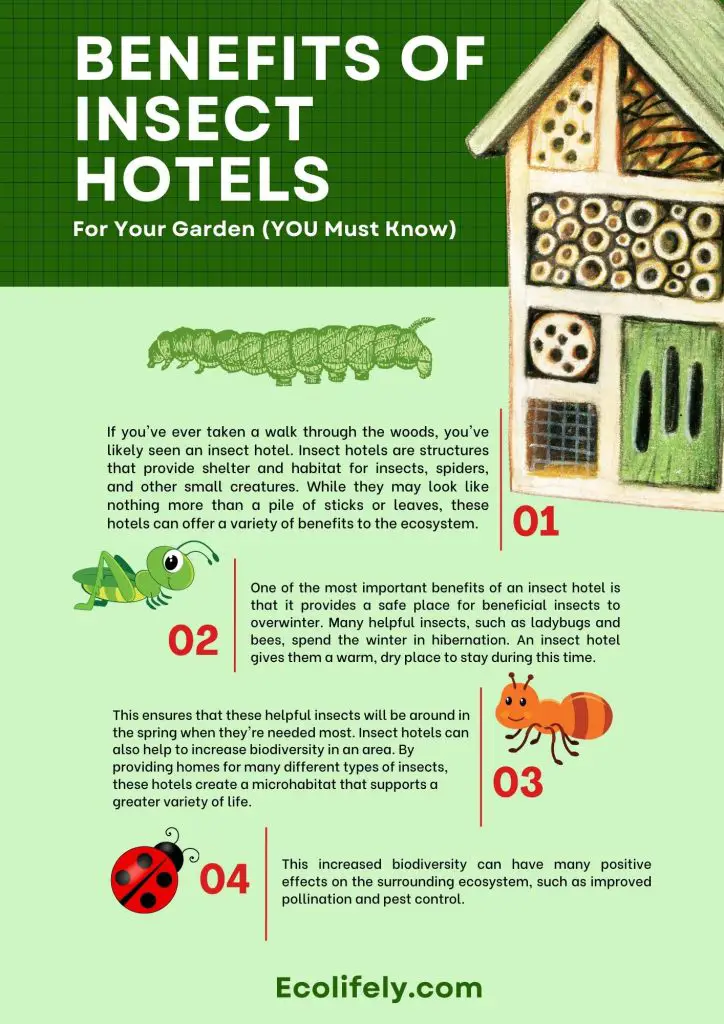
Monitoring and Tracking
Observation and Documentation
Monitoring and tracking the activity in your insect hotel is essential to assess its effectiveness and make any necessary adjustments. Regularly observe the hotel and document the types of insects that are nesting in it. Take note of any changes in insect populations or patterns of activity. This will help you understand which bugs are benefitting from the hotel and allow you to make any necessary improvements or modifications.
Tracking Insect Activity
Tracking the activity of the beneficial bugs in your garden can provide valuable insights into their behavior and preferences. Consider setting up additional monitoring devices, such as insect traps or pheromone lures, to capture and identify specific insect species. This information can be used to fine-tune your insect hotel or gardening practices to better support the needs of the beneficial bugs.
Using Technology for Analysis
Technology can be a powerful tool in monitoring and analyzing the effectiveness of your insect hotel. There are various smartphone apps and online platforms available that allow you to track and identify insect species. These tools can provide real-time data and help you gain a deeper understanding of the insect population in your garden. By leveraging technology, you can make data-driven decisions and optimize your insect hotel for maximum impact.
Mitigating Pest Risks
Preventing Nuisance Species Infestations
While insect hotels are designed to attract beneficial bugs, it is important to be mindful of potential nuisance species infestations. Some insects may take advantage of the shelter and resources provided by the hotel without providing any benefits in return. To prevent such infestations, regularly inspect your insect hotel and remove any unwanted pests. Implement preventive measures such as sealing cracks and crevices or using insect screens to keep out unwanted insects.
Addressing Disease Risks
Insects, like any other living organisms, can be susceptible to diseases. Insect hotels can potentially become breeding grounds for pathogens that can harm beneficial bugs. To address disease risks, maintain a clean and hygienic environment by regularly cleaning and disinfecting the hotel. Avoid overcrowding and ensure proper ventilation to prevent the spread of diseases. By prioritizing the health and well-being of the beneficial bugs, you can maintain a balanced and thriving ecosystem in your garden.
Avoiding Overpopulation
It is important to avoid overpopulating your insect hotel to prevent competition for resources and potential conflicts between insects. A well-designed and properly sized insect hotel should provide sufficient nesting options for the targeted beneficial bugs without risking overcrowding. If you notice signs of overpopulation, such as aggressive behaviors or a decline in the health of the insects, consider expanding the size or adding additional hotels to accommodate the growing population. Striking the right balance is crucial to maintaining a harmonious ecosystem in your garden.
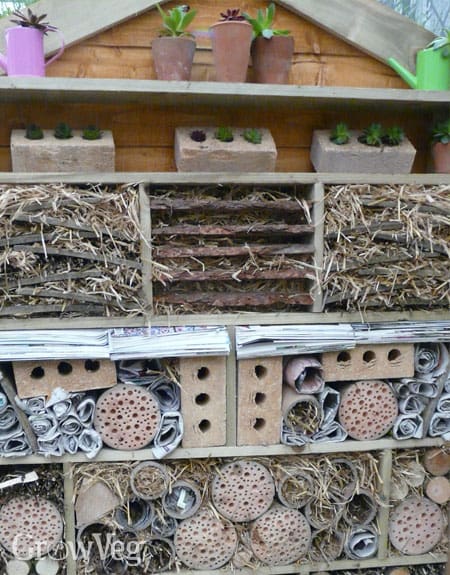

I am Randy, the author behind PestControld.com. Drawing from decades of experience, I aim to provide valuable insights, expert advice, and practical recommendations to help you make informed decisions when assessing viable pest control solutions.